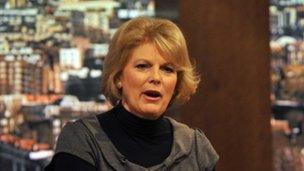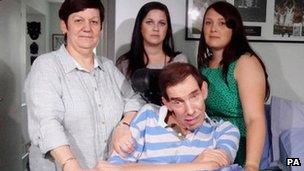Right-to-die law appalling, says Health Minister Anna Soubry
- Published
- comments

Anna Soubry was appointed a health minister in a reshuffle earlier this week
People seeking help to die should be allowed to obtain assistance in the UK, a newly-promoted health minister has said.
Anna Soubry told the Times, external it was "ridiculous and appalling" that Britons had to "go abroad to end their life".
She rejected euthanasia, but said "you have a right to kill yourself".
The Department of Health said the views were Ms Soubry's own, and the Ministry of Justice said there were no plans for the government to change the law.
It was a matter for Parliament to decide, the justice ministry added.
Ms Soubry, who was appointed a health minister in a reshuffle earlier this week, called for greater "honesty" over when people would be prosecuted over helping someone to die.
The Conservative MP for Broxtowe told the Times: "I think it's ridiculous and appalling that people have to go abroad to end their life instead of being able to end their life at home.
"You can't say to a doctor or a nurse, 'Kill this person' but.... you have a right to kill yourself.
"The rules that we have about who we don't prosecute allow things to happen but there's a good argument that we should be a bit more honest about it."
Her new department colleague, Liberal Democrat Norman Lamb, who was also appointed as a health minister in the reshuffle, said there was a case "for looking at reform".
"This is an individual decision of conscience - there's not a government policy on it.
"But I certainly think that we should debate it, the positives and negatives about reform, but I certainly, personally, think there is a case for looking at this."
Campaign group Dignity in Dying said assisted dying was an issue that Parliament "must address".
"Dying Britons who wish to control the time and manner of their death should not have to choose between suffering against their wishes or travelling abroad to die," a spokesman said.
He said Dignity in Dying was currently consulting - along with the all-party parliamentary group on choice at the end of life - on a proposed draft dying bill.
Former justice secretary Lord Falconer was committed to bringing a private members' bill in the House of Lords next year, he added.
'Sickening prospect'
In January, the Commission on Assisted Dying - led by Lord Falconer and set up and funded by campaigners who want to see a change in the law - said there was a "strong case" for allowing assisted suicide for people who are terminally ill in England and Wales.
But the report had a mixed response, with critics calling it biased.
Ms Soubry's fellow Conservative MP Mark Pritchard said attempts to change the law would be met with fierce opposition.
"Parliament writes the laws of the land not the CPS [Crown Prosecution Service] or individual ministers," he said.
"Any new right-to-die legislation will be rigorously fought by MPs from across the House.
"This is a slippery slope, which incrementally and over time, will reduce the 'right to life'."
And Paul Tully, of campaign group SPUC Pro-Life, warned that if assisted dying was legalised people with disabilities would be faced with "the sickening prospect that if they struggle with suicidal feelings they will be given help to die instead of care and support".
"Such a move would allegedly save huge amounts of public funds in the costs of caring for disabled, elderly and supposedly unproductive people," he added.
"Disabled people must speak up now before the minister starts trying to legislate against their equal right to exist."
The debate over assisted suicide has resurfaced after Tony Nicklinson, a man with locked-in syndrome, died a week after losing a legal bid to end his life.

Tony Nicklinson died at home surrounded by his wife, Jane, and two daughters, Lauren and Beth
He embarked on legal proceedings to clarify whether his wife would have been prosecuted for injecting him with a lethal dose of drugs.
Assisted suicide currently carries a sentence of up to 14 years' imprisonment.
His legal team argued that the current murder law would have infringed his right to respect for his private life as part of the European Convention on Human Rights.
But three High Court judges rejected his plea for the law to be changed, saying the issue should be left to Parliament.
He passed away days later, having refused food since the ruling.
The law currently draws a crucial distinction between doctors deciding not to provide or continue treatment, which might prolong life, and acting to end a life, by for example administering lethal drugs.
The British Medical Association (BMA) said its position was clear after a vote at its conference in June which opposed assisted dying.
Following the decision by High Court judges with regards to Mr Nicklinson, the BMA had said the court made "the right decision".
"The BMA is opposed to the legalisation of assisted dying and we are not lobbying for any change in the law in the UK," it said.
Mr Nicklinson's wife, Jane, meanwhile, has said she will appeal - as his widow and carer - against the High Court decision on his behalf because "nobody should have to suffer like Tony did".
Mrs Nicklinson, from Melksham, Wiltshire, said: "I am delighted that I am able to continue what Tony started."
She added: "It is too late for Tony but I hope that we can now help those who find themselves in a similar position."
- Published22 August 2012
- Published22 August 2012